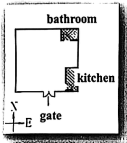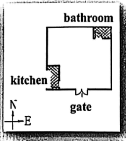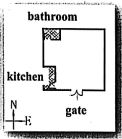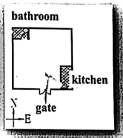A student is studying British English (英式英语). He wonders: Can I have a talk with Americans? Can they understand me? Learners of English often ask—what are the differences between British English and American English? How important are these differences?
Certainly, there are some differences between British English and American English. There are a few differences in grammar. For example, speakers of British English say “in hospital” and “Have you a pen?” Americans say “in the hospital” and “Do you have a pen?” Pronunciation is sometimes different. Americans usually sound the “r” in words like “car”and “farm”. Some speakers of British English do not sound the “r” in these words. There are differences between British English and American English in spelling and vocabulary. For example, “colour” and “honour” are British English spellings. “Color” and “honor” are American English spellings.
These differences are in grammar, pronunciation, spelling and vocabulary. However, they are not important. For the most part, British English and American English are the same language.
【小题1】In American English, we can say “Have you a new book?”【小题2】Between British English and American English, sometimes pronunciation is different.
【小题3】Englishmen say “in hospital”, while Americans say “at the hospital”.
【小题4】The word “color” is American English spelling.
【小题5】British English and American English are two different languages.
Few words are often spoken every day on the streets of Britain than “Sorry”. This word has become such an ordinary response(回应) that it has taken on a lot of meanings.
Sorry means to apologize. This is easy to understand. We learn it a lot as a native speaker or as a student of foreign languages.
But in Britain, it takes on another meaning. It is a cultural expression. Imagine this: a man walks down the street, looking down at his phone. A woman is walking in the opposite direction(反方向) to the man. She sees him, but she cant get out of the way in time. The man bumps into the woman. Who should say sorry? Naturally, the man should say sorry, because it was he who wasn’t looking. Yet in Britain, it is ordinary for both to apologize.
It is known that British people, like most people, do not enjoy conflict (冲突). So, to quickly make people less angry, British people will apologize to each other.
Other times it may sound funny to hear “sorry”. Some of my friends say it at restaurants, as they ask the waiter: “Sorry, but can I order another drink?” It is not to apologize, but just to say that we need the waiter. In Britain, sorry doesn’t always mean exactly what you think.
【小题1】What does the underlined phrase “bump into” mean in Paragraph 3?| A.Push down. | B.Hit by accident. | C.Say hello. | D.Shout at. |
| A.To tell an accident that people should stay away from. |
| B.To show how “sorry” has another meaning in Britain. |
| C.To tell why people should say sorry to each other. |
| D.To show how polite British people are. |
| A.Apologize. | B.To make others less angry. |
| C.To say what you’re thinking about. | D.To ask a waiter to bring something. |
| A.“Sorry” Is More Than Just an Apology | B.Interesting British People |
| C.How to Make Others Happy | D.Finding a Way Out of an Accident |
English is spoken as the first language by most people in the U.S.A., Britain, Australia, New Zealand, Ireland and Canada. However, English is spoken all over the world. It is the main language in over 60 countries, including India, Singapore and many of the Caribbean and Pacific islands. In these places, English is often spoken as the second language.
English is also an international language in many other countries, like China and Japan. People in these countries use it for business, and travelers to these countries use English to communicate when they get there. Other people may learn English because they enjoy reading books in English, listening to British or American music or watching American films.
English has changed a lot over the years and still goes on changing. It is no longer right to talk about British English or American English if the speakers come or don’t come from those countries. People in Japan and Korea, for example, may use the American spelling but may not sound like American.
English has been the most widely used language in the world by the end of the 20th century. This language no longer belongs to British, American or Australian speakers. It belongs to anyone in the world. So, as a middle school student today, you should think about how you can use this language. After you leave school, you will almost certainly need it.
根据材料内容,选择最佳答案。
【小题1】English is spoken as their ________ language in the U.S.A., Britain, Australia and so on.
| A.second | B.mother tongue | C.first | D.foreign |
| A.stays the same | B.has changed |
| C.has discovered | D.stays different |
| A.British; Englishmen | B.British; American |
| C.American; Englishmen | D.American; American |
| A.English is also an international language in many other countries. |
| B.English is the main language in over 50 countries. |
| C.English has been widely used by the end of 19th century. |
| D.Some people may learn English because they want to write books. |
| A.English is spoken only in European countries |
| B.some travelers must learn English when they travel to the English-speaking countries |
| C.the English language no longer belongs to British, American or Australian speakers |
| D.people in Japan and Korea may use the British spelling |
Have you ever wondered why we say maidongxi instead of mainanbei, and shangcesuo rather than xiacesuo? These directional words in Chinese are very interesting. They are not only about giving directions but also carry a wealth of history and culture.
East/west or south/north
One theory says that in the Tang Dynasty, when shopping, people in Chang’an usually went to the East Market first, and then the West Market and these markets became more and more popular as time went by. Gradually, people started to describe shopping as maidongxi.
Left or right
In Chinese, we say yijian xiangzuo when we have different opinions. Why is it not yijian xiangyou?
Most people today are right-handed. They feel uncomfortable if they try to use their left hand to write or use chopsticks. This was true in old times as well. In ancient Chinese, “left” was related to being different, such as in yijian xiangzuo. If people don’t accept common beliefs or always use some non-traditional ways to achieve a goal or solve problems, we say they are following pangmenzuodao.Up or down
We use shangcesuo to mean “go to the bathroom” and xiachufang to mean “go to the kitchen”. Why? In ancient times, houses were laid out in a certain way. The gate of the house would face south, with the bathroom in the northeast of the house and the kitchen in the southeastern part. On map, north is usually at the top while south is at the bottom. In Chinese, we talk about north as shang and the south as xia. Therefore, people would say they were going “up” to the bathroom and “down” to the kitchen.
These directional words help us find our way and get a glimpse into the interesting history and culture of ancient China as well. Next time you use them, maybe you can think about the special meanings behind them and make your conversations much more fun.
【小题1】How many popular markets were there in Chang’an in the Tang Dynasty?| A.One. | B.Two. | C.Three. | D.Four. |
A. | B. | C. | D. |
| A.It’s really fun to ________ camping outside, and we all love it so much. |
| B.Though you turn down our invitation, we still ________ your coming. |
| C.The trip to the museum made children ________ the development of science. |
| D.If you keep buying something expensive, you will ________ your money soon. |
| A.Interesting Stories of Directional Words | B.Cultural Meanings of Directional Words |
| C.Main Differences of Directional Words | D.Historical Development of Directional Words |
组卷网是一个信息分享及获取的平台,不能确保所有知识产权权属清晰,如您发现相关试题侵犯您的合法权益,请联系组卷网


